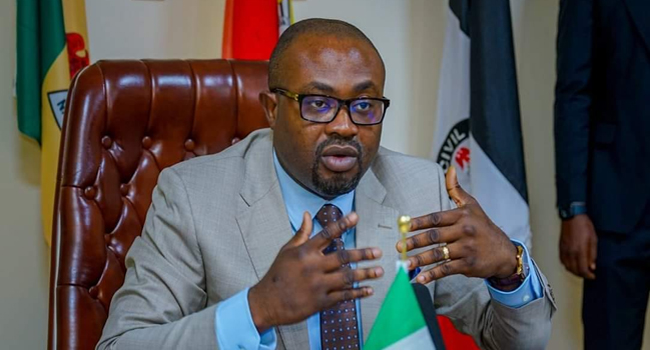FG Clears Over 200,000 Unprocessed Passport Backlogs, N28b Legacy Debt, Says Tunji-Ojo
Since taking office, Minister of Interior Olubunmi Tunji-Ojo boasts of having cleared more than 200,000 unprocessed passport application backlogs.
He announced the accomplishment while addressing the public and private sectors at the Access Bank Guest Lecture Series (GLS), which was hosted at the bank’s headquarters on Victoria Island in Lagos.
According to a bank statement released on Monday, the minister, who spoke on the topic of “Dare to Dream, Dare to Innovate,” articulated a broad vision for an innovation-driven government, ethical leadership, and urgent reform of the country’s penitentiary system.
Tunji-Ojo used his experience as an ethical hacker in his keynote talk to demonstrate how excellent leadership, like in cybersecurity, must be proactive in discovering and addressing weaknesses before they become crises.
“Leadership is not about responding to problems; it is about anticipating and resolving them before they arise. And for that, you must always ask: What is your goal? How will you carry it out? And when is the appropriate time to act?” he enquired. He highlighted the ministry’s progress since taking office and announced the repayment of ₦28 billion in legacy debt.
He stated that the ministry achieved these accomplishments without the need for increased federal funding.
Instead, he stated that the ministry had implemented a strategy centred around system integration, technological innovation, and financial self-sufficiency.
Among the advances mentioned were the implementation of e-visa platforms, contactless passport renewals for Nigerians in the diaspora, improved passenger information systems, and the establishment of a Tier-4 data centre to facilitate round-the-clock immigration services.
In one of the most moving moments of the occasion, the minister talked passionately about Nigeria’s flawed penitentiary system.
He said that over 4,000 offenders were imprisoned in detention institutions nationally due to their inability to pay penalties as little as ₦50,000.
“This is not a legal crisis but a moral one. “A society that punishes poverty more harshly than crime has lost its moral compass,” he said.
Tunji-Ojo noted that the ministry has now collaborated with private donors to obtain the release of many of these nonviolent offenders, and they are working on institutional reforms that prioritise rehabilitation over punishment.
These include digital case tracking to avoid indefinite detention, vocational training programs in correctional facilities, and public-private collaborations to improve living conditions and operational efficiency.
“A correctional facility should correct, not condemn. “Justice without dignity is injustice in disguise,” he stated.
Aigboje Aig-Imoukhuede, Chairman of Access Holdings PLC, welcomed the minister to the lecture series and commended his clear vision and decisive leadership. “What Dr. Tunji-Ojo has demonstrated is that innovation is not about big budgets; it is about big thinking,” Aig-Imoukhuede said, adding that his approach to public service is consistent with Access Group’s DNA of impact and quality.
Aig-Imoukhuede stated that the Guest Lecture Series was created to expand the conversation about leadership, accountability, and service.
“We cannot develop the Nigeria we want without leaders who understand systems, value people, and are committed to long-term change. Today’s chat demonstrated what that looks like in action.”
The event brought together executives, policymakers, and thought leaders from all around the country, underlining Access Bank’s position as not only a financial powerhouse but also a platform for national transformation via discourse, vision, and collaboration.
Tunji-Ojo’s last message encouraged participants to adopt a personal philosophy of excellence and purpose.
“Let Access Bank not just be a financial institution; let it be a philosophy.
“Let Nigeria be more than just a country of potential; make it a nation of performance. “It is time to refine our genius, not simply export it,” he stated.




